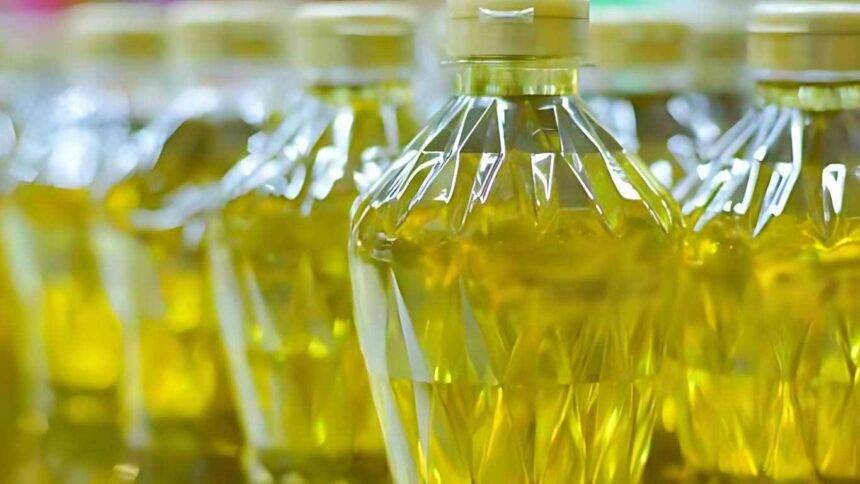Main Points In Hindi (मुख्य बातें – हिंदी में)
यहां पर <div id="ContentPlaceHolder1_div_story"> से संबंधित मुख्य बिंदु दिए गए हैं:
-
सरकारी निर्णय का अनुरोध: सॉल्वेंट एक्सट्रैक्टर्स एसोसिएशन ऑफ इंडिया (एसईए) ने भारतीय सरकार से अपील की है कि प्रमुख कृषि जिंसों के वायदा कारोबार पर लगे प्रतिबंध को हटाया जाए, जिनमें कच्चा पाम तेल और सोयाबीन शामिल हैं।
-
प्रतिबंध का विस्तार: यह प्रतिबंध पहली बार दिसंबर 2021 में लगाया गया था और इसको बार-बार बढ़ाया गया है, जो वर्तमान में 20 दिसंबर, 2024 तक जारी रहने की योजना है।
-
वित्तीय दबाव का सामना: एसईए के अध्यक्ष संजीव अस्थाना ने कहा है कि वायदा कारोबार पर प्रतिबंध ने खाद्य तेल उद्योग के लिए मूल्य जोखिम प्रबंधन और बाजार विकास में बाधाएं उत्पन्न की हैं, जिससे उद्यमों को वित्तीय तनाव का सामना करना पड़ रहा है।
-
मौजूदा कीमतें: एसईए ने बताया है कि सोयाबीन की मौजूदा कीमतें न्यूनतम समर्थन मूल्य (MSP) से नीचे कारोबार कर रही हैं, जबकि कच्चे पाम तेल जैसे अंतरराष्ट्रीय वस्तुओं पर वायदा कारोबार का पुनरारंभ जरूरी है ताकि मूल्य अस्थिरता को नियंत्रित किया जा सके।
- बाजार स्थिरता की आवश्यकता: एसोसिएशन ने जोर दिया है कि वायदा कारोबार की वापसी खाद्य तेल क्षेत्र के लिए महत्वपूर्ण है, ताकि व्यवसायों को बढ़ती कीमतों की अस्थिरता से बचाया जा सके और बाजार जोखिमों से सुरक्षा मिल सके।
Main Points In English(मुख्य बातें – अंग्रेज़ी में)
Here are the main points from the provided content:


-
Call to Lift Ban on Futures Trading: The Solvent Extractors Association of India (SEA) has urged the government to lift the ban on futures trading of various agricultural commodities, specifically raw palm oil and soybean, highlighting financial challenges faced by its members.
-
Ongoing Ban Details: The futures trading ban was initially imposed in December 2021 and has been extended multiple times, with the latest extension running until December 20, 2024.
-
Impact on the Industry: The SEA argues that the suspension of futures trading hampers price risk management and market development within the edible oil industry, leaving businesses vulnerable to price volatility.
-
Current Price Concerns: Current soybean prices are below the government-set minimum support price (MSP), while rapeseed prices are just above its MSP, adding to the industry’s financial strain.
- Need for Futures Trading Resumption: The SEA emphasizes that reintroducing futures trading for internationally traded commodities is crucial for stabilizing the market and protecting the industry from rising price instability.
Complete News In Hindi(पूरी खबर – हिंदी में)
(मेनाफ़न– केएनएन इंडिया)
नई दिल्ली, 26 नवंबर (केएनएन) सॉल्वेंट एक्सट्रैक्टर्स एसोसिएशन ऑफ इंडिया (एसईए) ने भारतीय से आह्वान किया है सरकार सहित प्रमुख कृषि जिंसों के वायदा कारोबार पर प्रतिबंध हटाने के लिए अपरिष्कृत पाम तेल और सोयाबीन, गंभीर का हवाला देते हुए वित्तीय इसके सदस्यों द्वारा सामना की जाने वाली चुनौतियाँ।
शुरुआत में दिसंबर 2021 में लगाया गया प्रतिबंध कई बार बढ़ाया गया है, नवीनतम विस्तार 20 दिसंबर, 2024 तक चल रहा है।
गृह सहित पांच प्रमुख सरकारी मंत्रियों को लिखे पत्र में मंत्री अमित शाह और वित्त मंत्री निर्मला सीतारमण, एसईए ने तर्क दिया कि वायदा कारोबार के निलंबन ने खाद्य तेल उद्योग के लिए मूल्य जोखिम प्रबंधन और बाजार विकास में काफी बाधा उत्पन्न की है।
एसईए के अध्यक्ष संजीव अस्थाना ने कहा, “उद्योग को उम्मीद थी कि परिचालन को सुचारू बनाने के लिए निलंबन हटा लिया जाएगा, लेकिन इस प्रतिबंध के जारी रहने से एक आवश्यक जोखिम शमन उपकरण और कमजोर हो गया है।”
उद्योग निकाय ने इस बात पर जोर दिया कि अध्ययनों से पता चला है कि वायदा कारोबार मुद्रास्फीति में महत्वपूर्ण योगदान नहीं देता है, जब पहली बार प्रतिबंध लागू किया गया था तो यह एक प्राथमिक चिंता थी।
इसके अलावा, एसईए ने बताया कि सोयाबीन की मौजूदा कीमतें सरकार द्वारा निर्धारित न्यूनतम समर्थन मूल्य (एमएसपी) 4,892 रुपये प्रति क्विंटल से नीचे कारोबार कर रही हैं, जबकि रेपसीड की कीमतें इसके एमएसपी 5,950 रुपये से थोड़ी ऊपर हैं।
एसईए ने विशेष रूप से कच्चे पाम तेल और सोयाबीन तेल जैसी अंतरराष्ट्रीय स्तर पर कारोबार वाली वस्तुओं के लिए वायदा कारोबार को फिर से शुरू करने की आवश्यकता पर प्रकाश डाला, यह तर्क देते हुए कि प्रतिबंध ने व्यवसायों को बढ़ी हुई कीमत अस्थिरता के संपर्क में छोड़ दिया है।
एसोसिएशन ने इस बात पर जोर दिया कि वायदा कारोबार के माध्यम से मूल्य में उतार-चढ़ाव के खिलाफ बचाव की क्षमता के बिना, खाद्य तेल क्षेत्र में कारोबार एक अलग नुकसान में हैं।
याचिका उद्योग द्वारा सामना किए जा रहे वित्तीय तनाव को रेखांकित करती है क्योंकि यह वैश्विक बाजारों में चल रही अनिश्चितताओं से जूझ रहा है। एसईए के अनुसार, वायदा कारोबार की वापसी को क्षेत्र को स्थिर करने और बाजार जोखिमों से सुरक्षा के लिए महत्वपूर्ण माना जाता है।
(केएनएन ब्यूरो)
MENAFN26112024000155011030ID1108928803
कानूनी अस्वीकरण:
मेनाफ़न किसी भी प्रकार की वारंटी के बिना जानकारी “जैसी है” प्रदान करता है। हम इस लेख में मौजूद जानकारी की सटीकता, सामग्री, चित्र, वीडियो, लाइसेंस, पूर्णता, वैधता या विश्वसनीयता के लिए कोई जिम्मेदारी या दायित्व स्वीकार नहीं करते हैं। यदि आपको इस लेख से संबंधित कोई शिकायत या कॉपीराइट समस्या है, तो कृपया उपरोक्त प्रदाता से संपर्क करें।
Complete News In English(पूरी खबर – अंग्रेज़ी में)
(मेनाफ़न– केएनएन इंडिया)
नई दिल्ली, 26 नवंबर (केएनएन) The Solvent Extractors Association of India (SEA) has called on the government to lift the ban on futures trading of major agricultural commodities like crude palm oil and soybean, citing serious financial challenges faced by its members.
The ban, initially imposed in December 2021, has been extended multiple times, with the latest extension set to last until December 20, 2024.
In a letter to five key government ministers, including Home Minister Amit Shah and Finance Minister Nirmala Sitharaman, the SEA argued that the suspension of futures trading has significantly hindered price risk management and market development in the edible oil industry.
SEA President Sanjeev Asthana stated, “The industry hoped for the suspension’s removal to facilitate operations, but the continuation of this ban has weakened a vital risk mitigation tool.”
The industry association emphasized that studies have shown that futures trading does not significantly contribute to inflation, which was a primary concern when the ban was first implemented.
Additionally, SEA pointed out that current soybean prices are trading below the government’s Minimum Support Price (MSP) of ₹4,892 per quintal, while rapeseed prices are just above its MSP of ₹5,950.
SEA highlighted the need to resume futures trading for internationally traded commodities like crude palm oil and soybean oil, arguing that the ban has exposed businesses to increased price volatility.
The association stressed that without the ability to hedge against price fluctuations through futures trading, the edible oil sector is facing significant losses.
This plea underscores the financial stress the industry is facing as it grapples with ongoing uncertainties in global markets. According to the SEA, reinstating futures trading is considered crucial for stabilizing the sector and protecting against market risks.
(केएनएन ब्यूरो)
MENAFN26112024000155011030ID1108928803
Legal Disclaimer:
मेनाफ़न provides information “as is” without any warranties. We do not accept responsibility for the accuracy, completeness, validity, or reliability of the information in this article. If you have any complaints or copyright issues related to this article, please contact the provider above.
This version simplifies the existing content while maintaining important details about the Solvent Extractors Association of India’s call to lift the ban on futures trading and the associated challenges.










